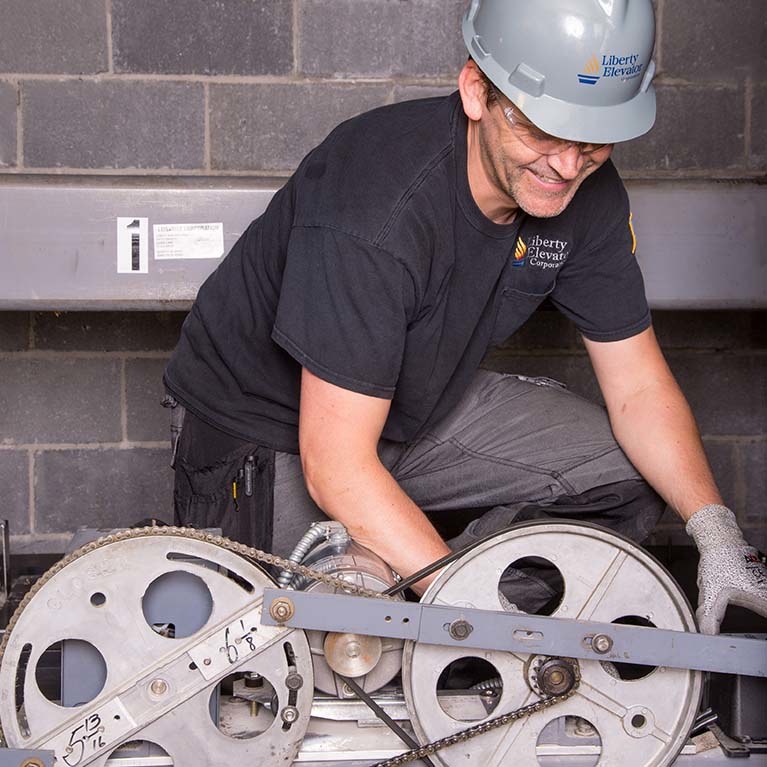Commercial elevator maintenance is best left to a qualified service provider, however, understanding what happens during routine elevator maintenance inspections can give you a better idea of the condition and functionality of your building's vertical transportation system. Becoming a more knowledgeable property manager empowers you to make better informed decisions about preventative maintenance, repairs and future modernizations of your elevator.
Routine Elevator Inspection
An experienced elevator mechanic will be able to diagnose your elevator issues through a typical maintenance inspection that focuses on five key areas: Inside the elevator cab, outside the elevator car, the elevator machine room, the elevator car top & the elevator pit.
Inside the Elevator Cab
Starting from the inside of the elevator, a routine maintenance inspection will check for any visible damage to the cab walls, ceiling, and handrails. Elevator buttons and position indicator lights are often targets for vandalism and may need to be replaced during the maintenance inspection. The elevator service mechanic will also operate the elevator to make sure it is running smoothly, doors are operating properly and the cab is leveling correctly at each floor.
Outside the Elevator Car
On the outside of the elevator, the maintenance mechanic will check the hall station lights and call buttons for damage and replace as necessary. The elevator door panels will be inspected for proper operations as well as for any damage or clearance issues. This stage of the maintenance inspection will include testing the firefighters’ service and Door Lock Monitoring system.
Elevator Machine Room
Inspecting the elevator machine room will focus on keeping any non-essential materials away from the machinery and outside of the machine room. The elevator mechanic will be checking for leaks and contaminants in the oil of hydraulic elevators, as these are signs of premature wear. Also, checking the functionality of the electrical equipment, taking a temperature reading to reduce the risk of machine overheating, lubricating essential components, and checking the elevator system’s oil levels.
Elevator Car Top
Many of the key components of an elevator are located on the top of the actual car. The elevator mechanic will inspect the door operator, hoist ropes, guide rails and roller guides atop the elevator cab. All visible components will receive inspection for any signs of wear, damage, or disconnection. Trained mechanics also keep an eye out for debris on top of the car and any signs of rodents, fire safety hazards, or vandalism that may be indicators of future issues.
Inspect the Elevator Pit
In the elevator pit, it’s necessary to check that the lights, stop switch, and GFI outlet are all functioning properly. The mechanic will be looking for signs of leaks, issues with the travel cables or moisture accumulation in the pit that might be corrosive to the exposed elevator components located under the cab. The elevator buffers need to be checked for signs of corrosion and misalignment, and the sump pump also needs to be cleaned and operating correctly. Although the GFI outlet & sump pump are most likely the responsibility of the property maintenance team, your elevator contractor can assist in accessing the pit for inspections and cleaning of debris. Signs of debris in the elevator pit may be a precursor to larger issues and should be proactively addressed.
Know the Elevator Repair Process
Throughout the maintenance process, if your elevator mechanic notices any problems, they will log them and make repairs on-site. If immediate repairs are not possible, the mechanic will schedule a follow up service and propose any major repairs.
The Liberty Elevator Advantage
To reduce the chances of an elevator entrapment, it is best to perform regular elevator maintenance and proactively address any aged equipment. Liberty Elevator's professional team offers you the freedom to choose the best solutions for your property by performing installations, repairs and routine maintenance to get your elevator running at it's best. Proudly serving New York, New Jersey, Philadelphia & South Florida.


